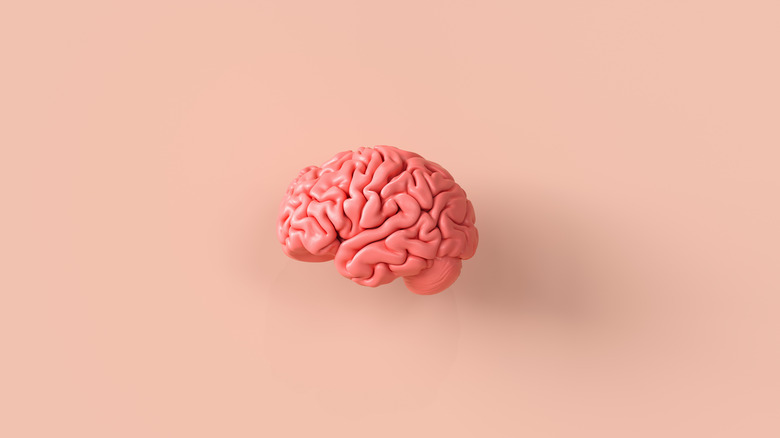What Does It Mean If You Have Wet Brain?
While humans have always been obsessed with exploring the greater universe around us, there actually has been a universe within us the entire time — our brains. According to Healthline, the human brain contains some 100 billion neurons. Coincidentally, that's the estimated number of stars in the Milky Way (via Space). While that fact alone may surprise you, the list of thought-provoking facts about the human brain could comprise an entire book.
For starters, the human brain has a unique fingerprint of neural activity that can identify an individual. Plus, it feels soft and mushy, like the gelatinous treat Jell-O, and there are no known limits to the amount of information the brain can retain. In fact, the brain weaves together stories from memories and continues to give birth to new cells throughout your entire life.
While the brain is an incredible organ, it is not infallible. Certain lifestyle choices can significantly impact brain health as you age. For example, alcoholism and certain diet deficiencies can contribute to the development of a condition known as wet brain (per Healthline). Here's everything you need to know about wet brain.
Alcoholism may put you at higher risk of developing wet brain
Wet brain is a common name for a potentially life-threatening condition called Wernicke-Korsakoff syndrome (WKS), reports the National Institute of Neurological Disorders and Strokes. WKS is caused by a deficiency in vitamin B1, also known as thiamine. Despite being widely reported as two different conditions, wet brain is actually made up of two stages. Wernicke encephalopathy is the acute stage of the disorder, where damage to the thalamus and hypothalamus of the brain can lead to symptoms like confusion, coma, loss of muscle coordination, and issues with vision. Korsakoff's amnesic syndrome, on the other hand, comprises the chronic stage of the disorder, where damage to nerve cells can lead to symptoms like amnesia, coma, tremors, and vision issues.
Nonetheless, alcoholism, a chronic disease where the individual is addicted to consuming alcohol and cannot control their drinking habits, is the leading cause of wet brain, or WKS, according to the American Addiction Centers. Notably, alcoholism often leads to poor diet and B1 deficiency, which is serious since B1 is only obtainable through your diet. On top of that, alcohol also can cause inflammation in the digestive tract, which, in turn, can negatively affect the efficacy of B1 absorption by the body.
How vitamin B1 deficiency can impact you
It's estimated that of those who have severe alcohol use disorder, an enormous 80% become deficient in thiamine or vitamin B1 (via American Addiction Centers). While only between 1% and 2% of Americans develop WKS, the prevalence rates in those who drink chronically are as high as 12% and 14%, pointing to the nutritional cause of WKS.
However, diagnosing WKS can be tricky. Since intoxication and withdrawal can mimic the symptoms of WKS, a person has to be sober while displaying symptoms in order to be diagnosed with WKS. If they aren't sober, it might be hard to tell if their symptoms are due to the effects of alcohol or a deficiency in vitamin B1. Nonetheless, getting sober is challenging for someone with alcohol use disorder, so their symptoms may go unnoticed.
Initially, symptoms of Wernicke encephalopathy, which is the first stage of WKS, typically include feeling apathetic, mentally confused, experiencing disturbances in your vision or eye movements, and losing muscle coordination when you're trying to stand up or walk. On the other hand, Korsakoff's psychosis is more severe. This type of brain damage includes symptoms such as hallucinations, memory issues, and behavior changes, such as irritability and showing less emotion.
Early detection is critical
The good news is that if it's caught early enough, some of the symptoms of WKS can be reversed (per the National Institute of Neurological Disorders and Stroke). But that means that not only does it need to be detected quickly, but it also needs to be treated quickly. Typically those with WKS need thiamine replacement in addition to nutritional changes, and sometimes drug therapy is required as well. Quitting drinking can also help prevent brain and nerve damage from continuing. However, memory function improves very slowly and often does not improve completely, so memory issues may always be an issue for those recovering from WKS.
If Wernicke's encephalopathy has already progressed to Korsakoff's syndrome, the brain will most likely be permanently impaired, according to the Hazelden Betty Ford Foundation. This then impacts the cardiovascular and central nervous systems, and life expectancy can be reduced to as little as six months. When WKS is not diagnosed, 20% of cases will end in death. If you think you may be experiencing WKS, contact your healthcare provider right away before your symptoms get worse and may become irreversible.




